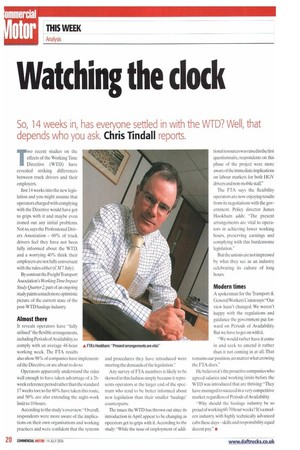Watching the clock
Page 20

If you've noticed an error in this article please click here to report it so we can fix it.
So, 14 weeks in, has everyone settled in with the VVTD? Well, that depends who you ask. Chris Tindall reports.
Two recent studies on the effects of the Working Time Directive (WTD) have revealed striking differences between truck drivers and their employers.
Just 14 weeks into the new legislation and you might assume that operators charged with complying with the Directive would have got to grips with it and maybe even ironed out any initial problems. Not so, says the Professional Drivers Association — 60% of truck drivers feel they have not been fully informed about the WTD, and a worrying 40% think their employers are not fully conversant with the rules either (CM 7 July).
By contrast the FreightTransport Association's Working Time Impact Study Quarter 2, part of an ongoing study paints a much more optimistic picture of the current state of the post-WTD haulage industry.
Almost there
It reveals operators have "fully utilised "the flexible arrangements. including Periods of Availability, to comply with an average 48-hour working week. The FTA results also show 98% of companies have implemented the Directive, or are about to do so.
Operators apparently understand the rules well enough to have taken advantage of a 26week reference period rather than the standard 17 weeks too: so far 60% have taken this route, and 50% are also extending the night-work limit to 10 hours.
According to the study's overview: "Overall, respondents were more aware of the implications on their own organisations and working practices and were confident that the systems and procedures they have introduced were meeting the demands of the legislation."
Any survey of FTA members is likely to be skewed in this fashion simply because it represents operators at the larger end of the spectrum who tend to be better informed about new legislation than their smaller 'haulage' Counterparts.
The issues the WTD has thrown out since its introduction in April appear to be changing as operators get to grips with it. According to the study: "While the issue of employment of addi tional resources was raised in the first questionnaire, respondents on this phase of the project were more aware of the immediate implications on labour markets for both HGV drivers and non-mobile star The FTA says the flexibility operators are now enjoying results from its negotiations with the government. Policy director James Hookham adds: "The present arrangements are vital to operators in achieving lower working hours, preserving earnings and complying with this burdensome legislation."
But the unions are not impressed by what they see as an industry celebrating its culture of long hours.
Modern times
A spokesman for the Transport & General Workers Union says:"Our view hasn't changed. We weren't happy with the regulations and guidance the government put forward on Periods of Availability. But we have to gel on with it.
"We would rather have it come in and seek to amend it rather than it not coming in at all. That remains our position, no matter what crowing the FTA does."
He believes it's the proactive companies who agreed salaries and working limits before the WTD was introduced that are thriving: "They have managed to succeed in a very competitive market, regardless of Periods of Availability.
"Why should the haulage industry he so proud of working 60-70 hour weeks? It's a modern industry, with highly technically advanced cabs these days—skills and responsibility equal decent pay." •










































































































































































































